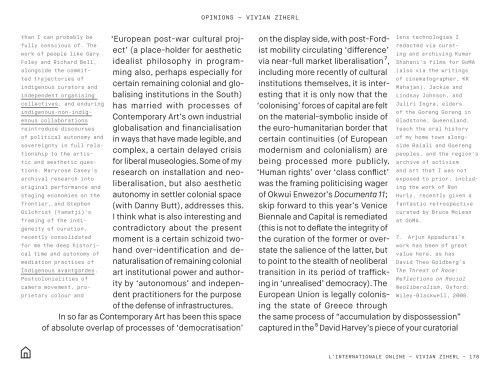DECOLONISING MUSEUMS
decolonisingmuseums-4
decolonisingmuseums-4
You also want an ePaper? Increase the reach of your titles
YUMPU automatically turns print PDFs into web optimized ePapers that Google loves.
OPINIONS – VIVIAN ZIHERL<br />
‘European post-war cultural project’<br />
(a place-holder for aesthetic<br />
idealist philosophy in programming<br />
also, perhaps especially for<br />
certain remaining colonial and globalising<br />
institutions in the South)<br />
has married with processes of<br />
Contemporary Art’s own industrial<br />
globalisation and financialisation<br />
in ways that have made legible, and<br />
complex, a certain delayed crisis<br />
for liberal museologies. Some of my<br />
research on installation and neoliberalisation,<br />
but also aesthetic<br />
autonomy in settler colonial space<br />
(with Danny Butt), addresses this.<br />
I think what is also interesting and<br />
contradictory about the present<br />
moment is a certain schizoid twohand<br />
over-identification and denaturalisation<br />
of remaining colonial<br />
art institutional power and authority<br />
by ‘autonomous’ and independent<br />
practitioners for the purpose<br />
of the defense of infrastructures.<br />
In so far as Contemporary Art has been this space<br />
of absolute overlap of processes of ‘democratisation’<br />
than I can probably be<br />
fully conscious of. The<br />
work of people like Gary<br />
Foley and Richard Bell,<br />
alongside the committed<br />
trajectories of<br />
indigenous curators and<br />
independent organising<br />
collectives, and enduring<br />
indigenous-non-indigenous<br />
collaborations<br />
reintroduce discourses<br />
of political autonomy and<br />
sovereignty in full relationship<br />
to the artistic<br />
and aesthetic questions.<br />
Maryrose Casey’s<br />
archival research into<br />
original performance and<br />
staging economies on the<br />
frontier, and Stephen<br />
Gilchrist (Yamatji)’s<br />
framing of the indigeneity<br />
of curation,<br />
recently consolidated<br />
for me the deep historical<br />
time and autonomy of<br />
mediation practices of<br />
Indigenous avantgardes.<br />
Postcolonialities of<br />
camera movement, proprietary<br />
colour and<br />
lens technologies I<br />
on the display side, with post-Fordist<br />
mobility circulating ‘difference’<br />
redacted via curat-<br />
via near-full market liberalisation 7,<br />
including more recently of cultural<br />
institutions themselves, it is interesting<br />
that it is only now that the Lindsay Johnson, and<br />
Mahajan). Jackie and<br />
Juliri Ingra, elders<br />
‘colonising’ forces of capital are felt<br />
on the material-symbolic inside of<br />
the euro-humanitarian border that<br />
certain continuities (of European<br />
modernism and colonialism) are<br />
being processed more publicly. archive of activism<br />
‘Human rights’ over ‘class conflict’<br />
was the framing politicising wager<br />
ing the work of Ron<br />
of Okwui Enwezor’s Documenta 11;<br />
skip forward to this year’s Venice<br />
Biennale and Capital is remediated<br />
at GoMA.<br />
(this is not to deflate the integrity of<br />
the curation of the former or overstate<br />
the salience of the latter, but<br />
value here, as has<br />
to point to the stealth of neoliberal<br />
The Threat of Race:<br />
transition in its period of trafficking<br />
in ‘unrealised’ democracy). The<br />
European Union is legally colonising<br />
the state of Greece through<br />
the same process of “accumulation by dispossession”<br />
captured in the 8 David Harvey’s piece of your curatorial<br />
ing and archiving Kumar<br />
Shahani’s films for GoMA<br />
(also via the writings<br />
of cinematographer, KK<br />
of the Goreng Goreng in<br />
Gladstone, Queensland,<br />
teach the oral history<br />
of my home town alongside<br />
Baiali and Goereng<br />
peoples, and the region’s<br />
and art that I was not<br />
exposed to prior, includ-<br />
Hurly, recently given a<br />
fantastic retrospective<br />
curated by Bruce McLean<br />
7. Arjun Appadurai’s<br />
work has been of great<br />
David Theo Goldberg’s<br />
Reflections on Racial<br />
Neoliberalism, Oxford:<br />
Wiley-Blackwell, 2008.<br />
L’INTERNATIONALE ONLINE – VIVIAN ZIHERL – 178


